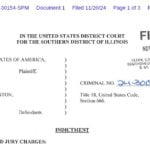Shelby Co. (ECWd) –
For years we have focused on a simple narrative in our local government accountability work: follow the law. While simple to most, in many places we go, we have people jump to a false narrative that we have some ulterior agenda. It appears to be human nature but sadly, those same people never actually speak with us but rather assume facts not in evidence or believe whatever they read online and share it with the world because they agree with it, all while not knowing if it’s actually true or accurate. When their emotional convictions override logic, it tends to fester like a cancer among others who have either not been educated on critical thinking or are simply driven by an agenda, truth be damn.
Some of these same people create anonymous social media outlets to spread their beliefs, commonly filled with innuendos and half-truths rather than the whole truth or facts. By being anonymous the person is void of any accountability for such ignorance being posted, all while those providing supportive comments end up showing their ignorance.
We The People have an obligation to protect the people’s right to say what they want, but we also have an obligation to call it out when it’s agenda-driven propaganda.
Shelby County is no newcomer to these types of games.
A recent addition to the door of the Shelby County State’s Attorney was his name and below that the words “no photography”. That addition has triggered the naysayers and in a matter of a few hours, the level of ignorance as to our Constitutional Rights has risen to a point of sadness.
“Recently stenciled on the SA’s door is a prohibition of photography. A public office in a public hallway in a public building. What gives the SA the statutory right to do this?”
The post generated all kinds of misinformation and claims regarding people’s constitutional rights regarding taking pictures. Only one person out of 46 at the time of publication asked a question as to where the no photography actually applied. Most understand a sign on the door applies to the room behind the door, such as a restroom. The logic of some of the comments would lead people to believe a “mens” sign on a door indicates you can urinate in the common area rather than in the room behind the door.
When it comes to our First Amendment Rights, the courts have spoken on just about every imaginable scenario, including photographs in a courthouse.
The Illinois Supreme Court has forbidden pictures from being taken in the courthouse and directed circuit courts to do the same by issuing a court order, standing order, or local rules as outlined by the Illinois Supreme Court in their Policy on Electronic Devices as found in Section (d). Note it requires (d)(1), (d)(2) to be included in local policies and those too are subject to the restrictions in paragraph s (d)(3-6)
Paragraph (d)(3) pretty much covers the matter at hand.
3. Prohibited Uses in Common Areas and Courtrooms: The taking of photographs, audio, and video recordings are generally prohibited without prior approval of a judge or as governed by Illinois Supreme Court Rule 44.”
This is the time when people are going to say the Illinois Supreme Court does not trump our U.S. Constitution. We agree.
From the U.S. Supreme Court: “Nothing in the Constitution requires the Government freely to grant access to all who wish to exercise their right to free speech on every type of Government property without regard to the nature of the property or to the disruption that might be caused by the speaker’s activities.” Cornelius v. NAACP Legal Def. & Educ. Fund, Inc., 473 U.S. 788, 799–800 (1985) – UNC Chapel Hill School – of Government
From UNC Document: Offices and Workspaces of Government Employees
“There is limited case law analyzing government employee offices as a “forum” for First Amendment purposes. However, courts that have evaluated the issue have consistently held that office spaces for government employees are nonpublic forums. As the Supreme Court stated: The [government] workplace, like any place of employment, exists to accomplish the business of the employer. ’[T]he Government, as an employer, must have wide discretion and control over the management of its personnel and internal affairs.’ It follows that the Government has the right to exercise control over access to the [government] workplace in order to avoid interruptions to the performance of the duties of its employees
Likewise, the Seventh Circuit has broadly stated: “A public agency’s administrative headquarters is presumptively not a public forum.”
Understanding our rights is a duty we have if we are going to exercise them. Understanding the difference between a public area and a public forum is critical when it comes to knowing when our First Amendment right may not be absolute as some believe.
What gives the State’s Attorney the statutory right to prohibit photography in his office? The question is incomplete and implies a statute would be the source of such authority. There is no statute, which is a state law, giving a SA the power to prohibit photography in his office. However, that does not mean he does not have the power to do so. An accurate question, assuming they want the actual answer, would be, under what authority can a State’s Attorney prohibit photography in their office?
Based on the included Illinois Supreme Court Policy and the numerous case law citations within the UNC Local Government Law Bulletin, it appears the authority for a State’s Attorney or any other officeholder in a courthouse to prohibit photos from being taken is vested in long-established case law.
The Illinois Supreme Court directed the lower courts to issue an order, policy, or rule on electronic devices that required key language to be included. That being the case, it appears the courts have ordered no photography in common areas of a courthouse.
The sign on the door that has triggered the naysayers applies to the inside portion of the office. The outside area is under the control of the Supreme Court rules which it appears are being ignored by a select group of people. In fact, one such fool took a picture from inside the courtroom and then published it. Should he be held accountable for violating the court’s rules?
What makes this matter so sad is some of the same people concerned about their perceived right to take pictures in his office are the same people claiming records being taken out of the office to be scanned are not secured and could be copied by someone. If they are so concerned about someone copying or seeing a file are they so stupid to not understand a photograph could capture the very same information that he is duty bound to protect?
The protection of the information in those files is the very reason he does not permit photography in his office. And for the confused, videotaping or filming is a form of photography.
For more reading on this subject see: https://www.oif.ala.org/auditing-the-first-amendment-at-your-public-library/








1 Comment
Droopy: Master Sergeant
Posted at 16:35h, 23 AugustThe county clerk has a prohibition against using a cell phone in her office. Taking pictures of county records is prohibited.
I guess they do not have a problem with any other office? Including some who have truly broken the law. Same said people want a state’s attorney who will not prosecute public corruption. That is what has gone on in Shelby county for decades. Some elitist can’t stand the little guy having a voice and being represented.